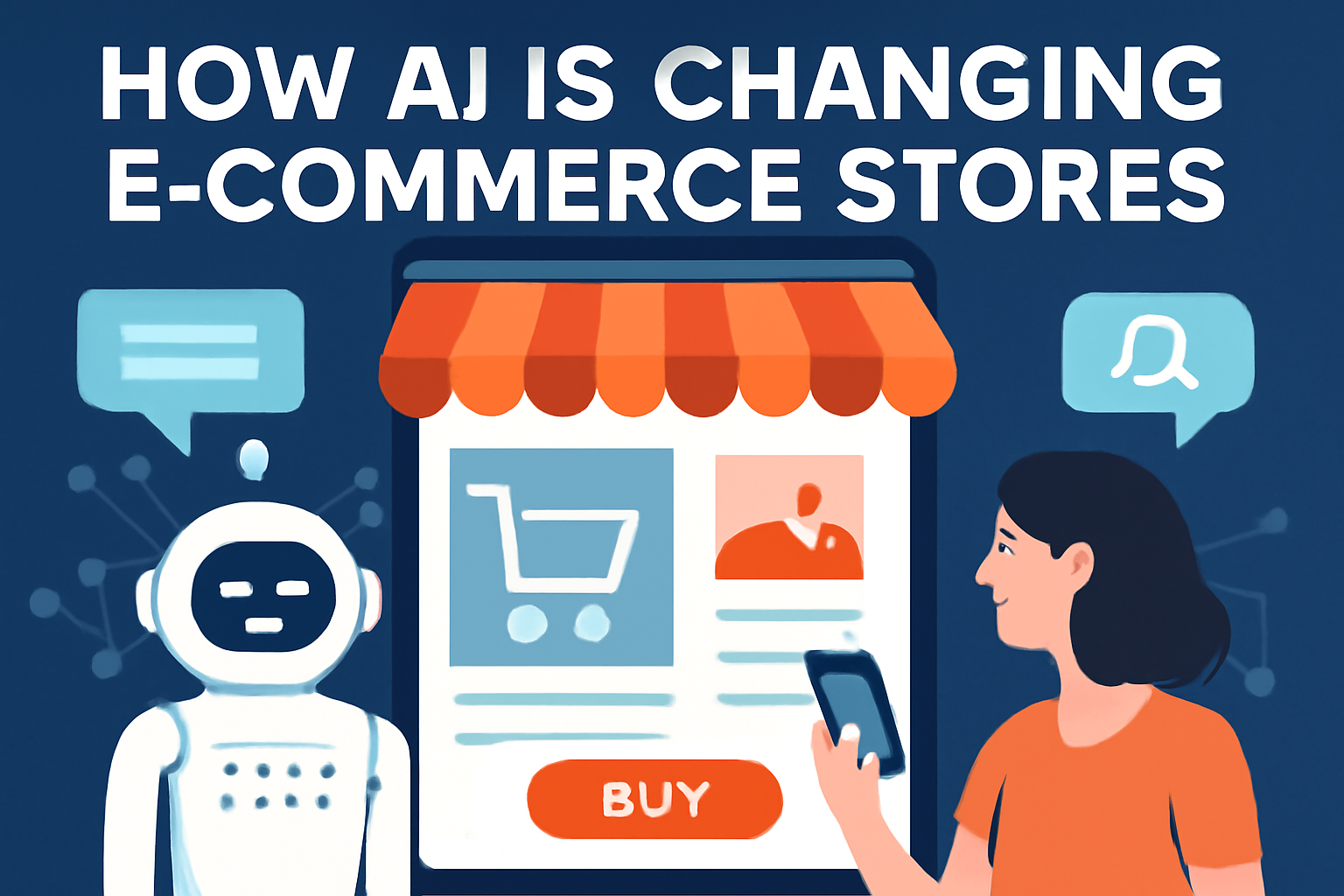E-commerce has changed a lot over the years. What used to be a simple way to shop online is now fast, easy, and tailored to us. Today, we get product suggestions based on what we like, fast checkouts, and quick customer support, all thanks to technology.
One of the biggest reasons for this change is Artificial Intelligence (AI). AI is changing how online stores work by making shopping more personal, using chatbots to help customers, predicting which products will be popular, and improving marketing. In short, AI is making online shopping smarter and easier for everyone.
In this blog, we’ll look at how AI is changing e-commerce. We’ll see how AI helps make shopping more personal, improves customer service, helps manage inventory, and makes marketing better.

Whether you run an online store or just want to know how AI is changing shopping, this blog will show you how AI is shaping the future of e-commerce.
Understanding AI in E-Commerce
What is AI and How Does It Work in E-Commerce?
Artificial Intelligence (AI) is technology that helps machines do things that usually need human thinking. These things include learning from data, making decisions, and understanding language. In online shopping, AI helps stores work better by improving customer experiences and making shopping easier.
For example, AI can look at how customers shop and suggest products they might like. It can also help businesses keep track of products, answer questions with chatbots, and improve marketing. In short, AI helps online stores work better and makes customers happier.
Different Types of AI Used in E-Commerce
- Machine Learning (ML)
- What it is: Machine Learning is a type of AI that allows machines to learn from data and improve over time without being told exactly what to do.
- How it helps e-commerce: In online stores, ML helps predict what products a customer might like based on what they’ve bought before. It can also change prices automatically based on demand or competitor prices.
- Natural Language Processing (NLP)
- What it is: Natural Language Processing helps computers understand and respond to human language.
- How it helps e-commerce: NLP powers chatbots, which help customers by answering questions and providing support. It can also understand customer reviews to know how people feel about a product.
- Recommendation Algorithms
- What it is: These algorithms suggest products to customers based on their interests and past behavior.
- How it helps e-commerce: When you see “people who bought this also bought” suggestions, that’s AI working. It helps businesses suggest products that customers are more likely to buy, making shopping easier and boosting sales.
- Chatbots and Virtual Assistants
- What they are: These are AI tools that talk to customers, answer their questions, and help them find what they need.
- How they help e-commerce: Chatbots answer customer questions quickly, saving time and making shopping simpler. They can help with common questions like return policies, shipping info, and product details.
- Predictive Analytics
- What it is: Predictive analytics uses past data to make predictions about the future.
- How it helps e-commerce: It helps businesses figure out which products will be in demand and ensure they have enough stock to meet that demand.
By using AI, online stores can make shopping better, sell more, and save money. AI is not just a nice extra anymore—it’s something every store needs to stay competitive.
Key Benefits of AI for E-Commerce Stores
Personalized Shopping Experience
One of the best things AI can do for e-commerce is create a personalized shopping experience. It looks at what customers have bought before, what they’ve browsed, and what they like to show them products that are most likely to interest them. This makes shopping feel more relevant and personal.
How AI Helps Tailor Product Recommendations and Content
AI uses data from a customer’s past purchases, browsing habits, and even how much time they spend looking at certain products. It then suggests items that they’re more likely to buy. For example:
- If someone buys a pair of shoes, AI might recommend matching accessories or socks.
- If a customer often buys workout gear, AI might suggest new exercise equipment or fitness accessories.
AI can also personalize the content on a website. If a customer often looks for eco-friendly products, AI might show them articles or product suggestions related to sustainable living.
Case Studies of Successful Personalized E-Commerce Experiences

